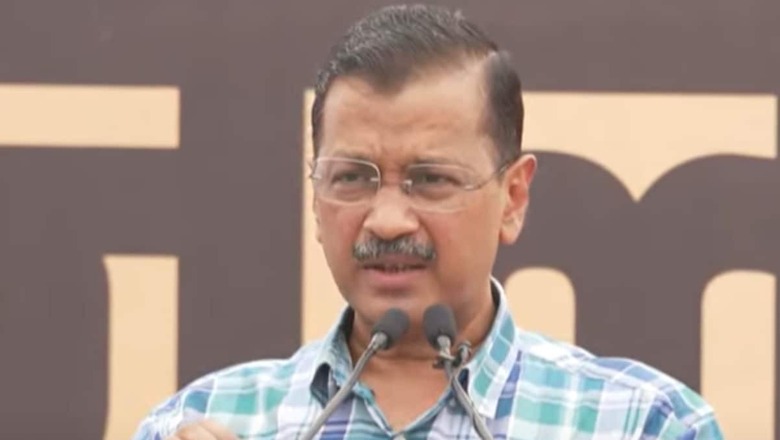
views
The 2024 Lok Sabha elections in Delhi were very different from any others. For the first time since the formation of AAP in 2012, the party fought these elections in an alliance with the Congress. Also, the arrest of chief minister Arvind Kejriwal on March 21, just five days after election dates were announced on March 16, and his unprecedented release on interim bail for 21 days on May 10 purely for the purposes of campaigning by the Supreme Court, a relief that incidentally the CM had not asked for. After ten years, elections in Delhi were a bipolar contest. Aam Aadmi Party chief Arvind Kejriwal voted for the Congress and senior Congress leader Rahul Gandhi voted for AAP. Yet, even after pooling resources and putting up joint candidates, AAP and Congress failed to open their accounts in Delhi for the third consecutive Lok Sabha election.
In Chandni Chowk, where Congress fancied its chances, BJP candidate Praveen Khandelwal was victorious. In East Delhi, where AAP had put up a Dalit face, Kuldeep Kumar, from a general constituency, BJP’s Harsh Malhotra was the winner. In New Delhi, the chief minister’s constituency, BJP’s Bansuri Swaraj defeated AAP’s Somnath Bharti. In North East, BJP’s Manoj Tiwari beat Congress candidate Kanhaiya Kumar. In North West, BJP’s Yogendra Chandoliya vanquished Congress’s Udit Raj. In South Delhi, BJP’s Ramvir Singh Bidhuri trounced AAP’s Sahiram Pehalwan. In West Delhi, AAP’s Mahabal Mishra was surpassed by BJP’s Kamaljeet Sherawat. The only change from the election results of 2014 and 2019 was the margin of defeat was reduced this time. But the bottom line was that in spite of the Congress-AAP alliance and the big arrests of Aam Aadmi Party leaders including Kejriwal, both the parties failed to open their account. The BJP swept all seven seats. The party had replaced all its incumbent MPs except Manoj Tiwari.
When the Delhi chief minister was arrested on March 21, former AAP ministers Satyendar Jain, Manish Sisodia, and AAP MP Sanjay Singh along with communications in-charge Vijay Nair had already been behind bars for periods of anything between two years to four months. AAP was already shorn of its key lieutenants on the battlefield.
The Enforcement Directorate sent the first summons to the Delhi chief minister asking him to appear before it on November 1. It would send nine more, all of which the chief minister challenged with replies calling them “illegal” and “politically motivated”, and offering to appear via videoconferencing instead. Five days later, the party held a crucial meeting with its MLAs in the Delhi assembly where the MLAs told Kejriwal to remain CM even if he were arrested. Since then, AAP organised a nationwide referendum on whether Kejriwal should continue as chief minister even after his arrest or resign. In Delhi, the party organised a “signature campaign” and went from door to door to mobilise opinion in favour of the chief minister.
Kejriwal maintained that he was “not afraid of going to jail” and “the Prime Minister was scared of AAP emerging as a challenge and wanted to crush it. AAP, which contested Madhya Pradesh, Rajasthan, and Chhattisgarh assembly elections, returned emptyhanded.
AAP was already part of the INDIA bloc after the Congress declared its support for the party during voting on the Delhi Services Bill in Parliament. However, there were many humps before a seat-sharing arrangement between the two could be hammered out. After two rounds of talks, the first positive indication for the alliance came from Chandigarh where the two allied for the mayoral elections.
As Trinamool Congress chief Mamata Banerjee walked out of the alliance and declared that the TMC would go it alone in West Bengal, Punjab chief minister Bhagwant Mann declared the same for his state and, ultimately, there was no tie-up with the Congress there. Even as talks were going on, Kejriwal dropped another bombshell, alleging that “they ( the BJP) asked me to join them, but I said I will never do that whatever the consequences may be”. However, neither the party nor Kejriwal himself could offer any evidence to back this allegation, and many of a similar nature would follow, with the party claiming that the BJP was hatching an “operation lotus” to topple the Delhi government and had offered Rs 25 crore each to some of its MLAs. The BJP denied these charges furiously with its state chief Virendra Sachdeva even slapping a defamation notice against AAP minister Atishi.
After a fierce tussle for seats in the opposition INDIA bloc, which saw AAP unilaterally declare its Goa, Gujarat, and Assam candidates, the party finally sealed a deal with the Congress in late February. The AAP-Congress arrangement in Delhi was 4:3; in Haryana, AAP wrested one seat, Kurukshetra, from the Congress; in Gujarat, AAP took two, Bharuch and Bhavnagar, and in turn, withdrew its Goa candidates.
The stage was set for the 2024 elections. AAP fielded its Malviya Nagar MLA Somnath Bharti from New Delhi, Kondli MLA Kuldeep Kumar from East Delhi, Tughlakabad MLA Sahiram Pehalwan from South Delhi, and former Congress MP Mahabal Mishra from West Delhi. The Congress decided to introduce Kanhaiya Kumar, who had lost his first election in Bihar’s Begusarai in 2019, from North East, former MP Udit Raj from North West, and former legislator JP Agarwal from Chandni Chowk. The two former rivals and current allies formed a coordination committee to fight the elections as “one force” only in the first week of May.
One of the strongest reasons for the two parties coming together in Delhi was the results of the 2019 and 2014 Lok Sabha elections. Even though AAP had won 28 assembly constituencies in its debut elections, it had failed to open its account in the Lok Sabha polls that happened a few months later. And in spite of winning 67 of the 70 assembly constituencies in 2015, it again failed to open its account in the parliamentary polls in 2019. In fact, its performance slipped compared to 2014. And, a look at the statistics would show that even if AAP and Congress came together, BJP was still ahead with over 50% of the vote share. An alliance offered the promise of a fight.
Prior to Kejriwal’s arrest, AAP’s slogan was “Sansad mein bhi Kejriwal”, which the party changed to “Jail ka jawab vote se” afterwards. Posters of Kejriwal behind bars adorned the backdrop of the party’s press conferences and campaigns. AAP MP Sanjay Singh’s release on May 4 had given the embattled party some energy for a fight. The Delhi chief minister’s wife Sunita Kejriwal held the fort while the party convener was jailed and she carried out her first-ever roadshow in the East Delhi constituency where she appealed to the people to “defeat dictatorship”. When the Delhi chief minister was released on May 10, the elections here were just 15 days away. Kejriwal plunged into the campaign immediately. Addressing supporters in the party office the next morning, he said, “Modi ji has started a very dangerous mission and that is ‘one nation, one leader’, by extinguishing the political careers of opposition leaders, by sending them to jail. If they win the elections, not that I believe that they will, you can take it from me in the form of an affidavit that after a few days, they will put Mamata Banerjee, Tejashwi Yadav, MK Stalin and his ministers, and Pinarayi Vijayan in jail.”
However, though Kejriwal’s release galvanised the campaign in Delhi, it was marred by the Swati Maliwal controversy. AAP’s young and only woman MP in a shocking charge alleged that she was assaulted at the chief minister’s residence by his personal assistant Bibhav Kumar. Kumar denied the charge but was arrested, and the allegations and counter-allegations cast a shadow over the campaign and presented AAP’s leadership with yet another crisis to handle. Wherever the chief minister went, questions on Swati Maliwal followed.
Arvind Kejriwal led roadshows for all AAP and Congress candidates in each of the seven Lok Sabha seats and held street corner meetings for his party’s four nominees. Kejriwal’s refrain was the same: “Today, one dictator is trying to capture the country. I am begging 140 crore people to save this country from this dictator. I am fighting with everything that I have…The BJP is asking the INDIA bloc who will be your prime ministerial candidate. I want to ask the BJP instead, who will be your prime ministerial candidate? Next year on September 17, the PM will turn 75. Modi ji himself has made the rule that retirement age is 75 years. Modi ji will retire next year on September 17…Modi ji is seeking votes not for himself but for Amit Shah.” In rally after rally, Kejriwal sought to explain to the people his reason for not resigning, arguing that it would be walking into the trap of the BJP. Kejriwal reiterated the familiar trope of the reason behind the arrest of AAP leaders being their work in building schools and hospitals.
However, the most important appeal that he made came towards the end of his speeches: “If you press the lotus button, I will go back to jail. However, if you press the broom or hand button, I will not have to go to jail again.” Effectively, Kejriwal made the Delhi elections a referendum on whether the locals wanted him to be in jail or not. Therefore, observers say, the rout in Delhi could be interpreted as a lack of sympathy for the chief minister.
Kejriwal surrendered on June 2 and would have watched the results from his cell in Tihar Jail. However, it is clear that AAP has to rework its strategy.




















Comments
0 comment